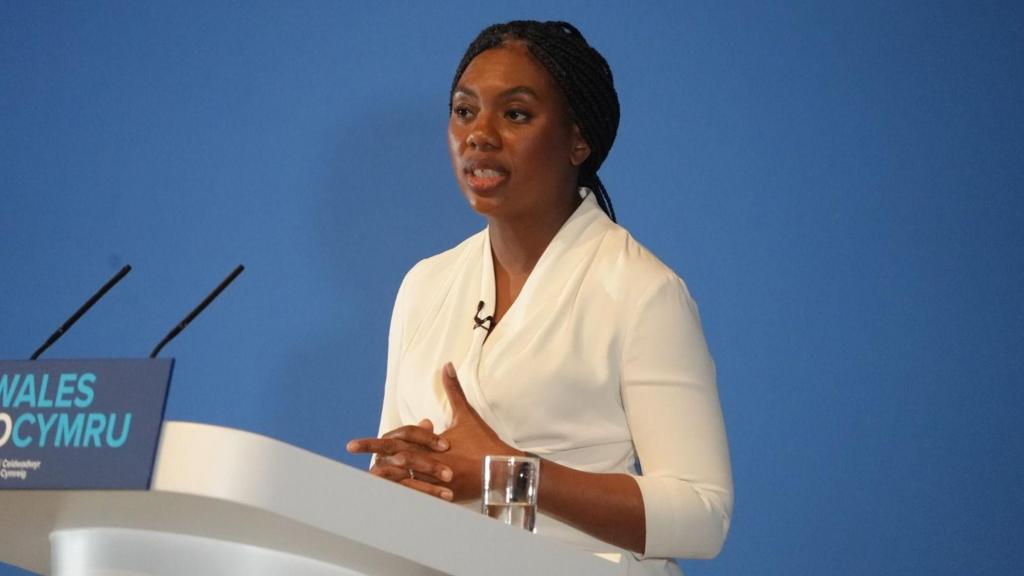UK Conservative leader Kemi Badenoch and Welsh Conservative Senedd leader Darren Millar have declined to definitively rule out potential post-election coalitions with Plaid Cymru or Reform UK following next year’s Welsh elections.
Current projections suggest a likely need for inter-party cooperation to form the next Welsh government, as achieving a majority appears improbable.
At the opening of the Welsh Conservatives’ conference in Llangollen, Millar stated his party’s willingness to collaborate with any party to oust the Labour government.
Badenoch, while having previously excluded collaboration with Reform UK at the UK level, acknowledged the possibility of post-election negotiations, yet dismissed such discussions as a premature distraction.
Recent polling places the Conservatives in fourth place behind Labour, Reform UK, and Plaid Cymru, a position reflecting their loss of all Welsh MPs in the last general election.
Millar characterized his party, holding 16 seats in the Senedd, as a “government in waiting,” while Badenoch urged members to actively counter Plaid Cymru and Reform UK.
While Labour is unlikely to collaborate with either the Conservatives or Reform UK, Plaid Cymru has ruled out working with Reform UK but remains open to potential alliances with Labour or the Conservatives.
Any coalition involving Plaid Cymru or Reform UK is likely to face significant internal Conservative opposition, particularly given Plaid Cymru’s advocacy for Welsh independence.
On BBC Radio Wales Breakfast, Millar affirmed his readiness to work with any party to remove the Labour government, reiterating this stance when questioned specifically about potential collaborations with Reform UK and Plaid Cymru.
In an interview with BBC Wales, Badenoch, when asked about potential deals with Plaid Cymru or Reform UK, prioritized the Conservatives’ focus on addressing Welsh issues, emphasizing that discussions about coalitions were a distraction from this core objective.
Although acknowledging the realistic possibility of such discussions, she underscored the party’s current concentration on securing as many seats as possible.
Reform UK leader Nigel Farage has indicated his party’s willingness to collaborate with other parties to form a Welsh government.
In her conference speech, Badenoch accused Plaid Cymru and Reform UK of prioritizing “identity politics,” contrasting their approaches with the Conservatives’ focus on substantive policy solutions.
She criticized Labour’s tendency to deflect blame and argued that Plaid Cymru and Reform UK were benefiting from Labour’s current Westminster administration. She emphasized that the Conservatives represent a distinct alternative, advocating for a pragmatic approach focused on delivering concrete results for the people of Wales.
Badenoch described last year’s election results as “devastating” and acknowledged, referencing recent local election results in England, that the party’s challenges are ongoing. She positioned Wales as the starting point for the party’s revitalization.
A minor gaffe in her speech, referring to “MSPs” instead of “MSs,” was later attributed to a simple slip of the tongue.
Millar described last year’s general election defeat as “bruising,” emphasizing the need to rebuild public trust. He highlighted the Conservatives as the only credible alternative to the current Labour government and stated that poor poll results motivate him to work harder.
The party launched several new policy proposals, including reducing NHS treatment wait times to a year and reinstating home economics in schools. These policies, Millar argued, showcase the Conservatives’ readiness for government.
The conference followed internal disagreements among party members regarding the selection of candidates, with concerns raised about the apparent exclusion of those critical of devolution. This issue was highlighted by the BBC.
By Gareth Lewis, BBC Wales political editor
While Badenoch avoided explicit endorsements of post-election deals, neither she nor Millar ruled them out, seemingly acknowledging this as the party’s best path to power in Cardiff Bay. However, Badenoch’s cautious approach contrasts with Millar’s earlier openness to such arrangements.
Badenoch’s previous rejection of a pact with Reform UK at the Westminster level, coupled with the potential challenges of selling a deal with Plaid Cymru to the Conservative membership, underscores the sensitivity surrounding such alliances. Her framing of post-election talks as a “stitch-up,” in contrast to the more pragmatic view within the Senedd, highlights differing perspectives between Westminster and devolved politics.
They will promise to reduce waits for treatment to no more than a year if they win power next May.
But Darren Millar says he “gets” people’s frustrations with devolution.
Mark Drakeford says the new law will strengthen the role of the Welsh language in education.
The Reform UK leader says he has no long term plan to lead the party in Wales.
She declines to endorse the prime minister’s warning about the UK becoming an “island of strangers”.

